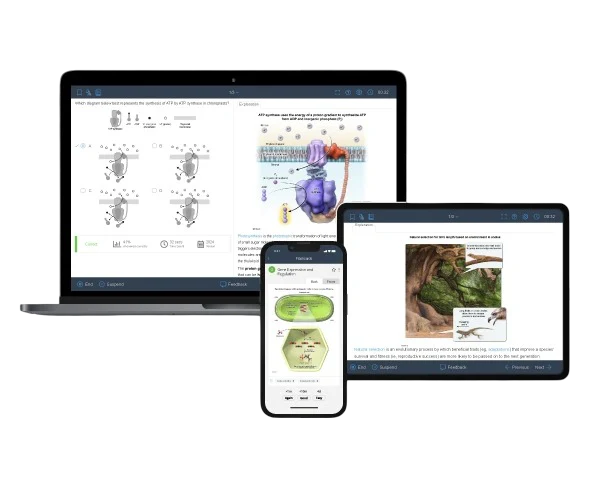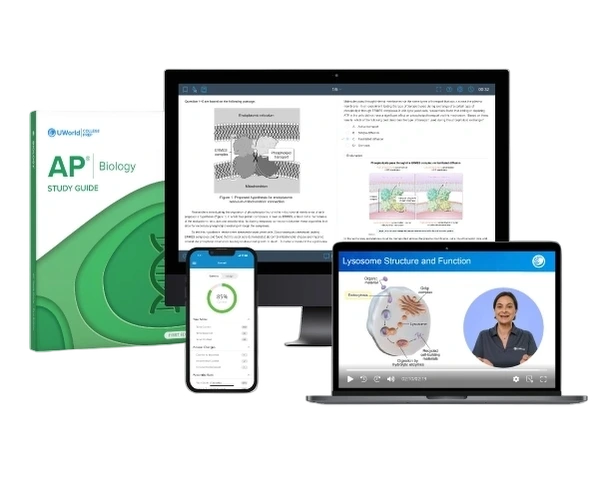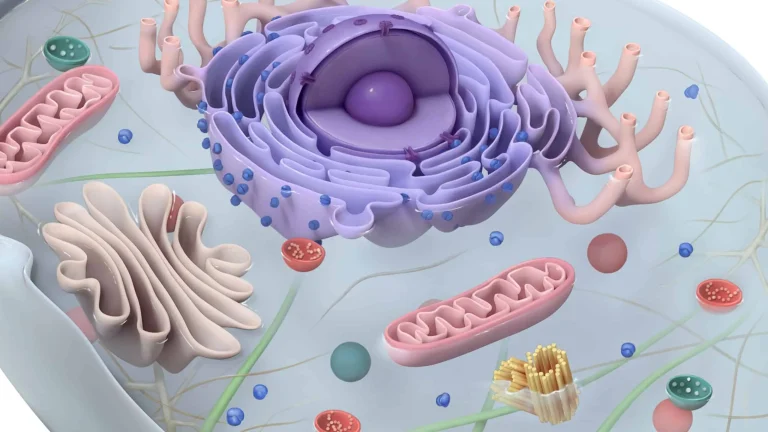Preparing for the AP® Biology exam requires a strategic approach. Below, you'll find essential information on how to study for AP Biology to help you study effectively and boost your confidence for test day. From mastering key concepts to practicing with AP-style questions, these strategies will set you up for success.
What Does the AP Biology Syllabus Cover?
The AP Biology exam consists of 2 sections: multiple-choice (MCQ) and free-response (FRQ), each accounting for 50% of your final score. The MCQ section includes 60 questions, while the FRQ section has 6 questions. Each must be completed in 1 hour and 30 minutes.
Here is a breakdown of the AP Biology units and their weights on the exam.
- Unit 1: Chemistry of Life (8-11%)
- Unit 2: Cell Structure and Function (10-13%)
- Unit 3: Cellular Energetics (12-16%)
- Unit 4: Cell Communication and Cell Cycle (10-15%)
- Unit 5: Heredity (8-11%)
- Unit 6: Gene Expression and Regulation (12-16%)
- Unit 7: Natural Selection (13-20%)
- Unit 8: Ecology (10-15%)
To understand in detail about the topics covered in these 8 units, check out our AP Biology course and exam description (CED).
How to Get a 3, 4, or 5 on the AP Biology Exam
Achieving a top score on the AP Biology exam takes dedication, smart study strategies, and regular practice. Follow these expert-backed AP Biology study tips to strengthen your understanding and improve your performance.
-
Take Advantage of Valuable Class Time
Make the most of your time in AP Biology class. Regardless of your learning style, the key to effective learning is mental engagement. Think critically about the course content, ask questions if you're unclear, and engage in productive discussions with your teacher and classmates.
-
Take Organized Notes
Avoid messy notes — keep them structured for easy review. Use our digital notebook to organize key concepts, diagrams, and images for quick reference. Struggling with a topic? Create flashcards, which use spaced-repetition technology to reinforce difficult concepts until you've mastered them.
-
Enhance Scientific Thinking Through Lab Work
It is important to have a solid understanding of the AP Biology labs to score high on the exam. The more hands-on experience you gain, the better you'll develop critical scientific thinking skills and grasp key concepts and science practices that form the foundation of the course.
-
Leverage Video Lessons for Better Retention
Supplement your learning with informational video lectures to break down complex topics. Jot down key points as you watch, and write down any questions to discuss in class the next day for further clarification.
-
Practice with AP-Level Questions
Consistent practice with high-quality questions is crucial. Use trusted resources like UWorld to work through AP-style questions with detailed explanations for correct and incorrect answers. To stay on track, form a study group with motivated classmates — grade each other's FRQs and discuss challenging topics to deepen your understanding.
AP Biology Quality Study Resources
Choosing the right study resources is key if you're looking to study effectively for the AP Biology exam. We've gathered a list of top study tools to streamline your preparation:
- AP Classroom : Platform by College Board offering unit guides, a question bank, and assignments.
- AP Daily Videos : YouTube lessons from College Board's AP teachers covering key concepts and exam questions.
- Past Exam Questions : Free-response questions and scoring guidelines from previous AP Biology exams.
- Quality Prep Courses: UWorld's AP Biology onlinecourse provides a comprehensive study guide, extensive question bank with hundreds of questions, and digital tools such as flashcards, a progress tracker, and an in-built calculator to enhance retention and performance.

AP Biology Study Plan and Tips
Success in AP Biology comes from effective study habits and a strategic approach. These customized AP Biology study plans & tips will help you stay on track, retain information, and perform your best on the exam.
- Begin in February to ensure ample time to cover all units.
- Units 1–2 (Chemistry of Life & Cell Structure and Function): Spend 1 week.
- Units 3–4 (Cellular Energetics & Cell Communication/Cell Cycle): Spend 2 weeks.
- Units 5–6 (Heredity & Gene Expression and Regulation): Spend 2 weeks.
- Unit 7 (Natural Selection): Spend 1.5 weeks.
- Unit 8 (Ecology): Spend 1 week.
- Refresh your understanding using your textbook or UWorld's AP Biology Study Guide.
- Set aside 2 to 3 short sessions each week to review MCQ-style practice questions.
- Consistently revisit challenging concepts.
- Start timing your MCQs to match exam conditions: Aim for about 1.5 minutes per question.
- Review past FRQs from the College Board to familiarize yourself with potential essay questions.
- Outline and practice writing responses at least twice a month.
- Time yourself to adapt to the exam pace.
- Create and review flashcards daily for key formulas and rules.
- Regularly schedule breaks to stay refreshed — plan a day off each week or take an afternoon off when necessary.
- Start with a general review of course topics, unit by unit at a quicker pace.
- Utilize resources such as textbooks, class notes, and course materials for concept refreshers.
- Prioritize completing textbook practice problems and using the UWorld's AP Biology Practice Test QBank 2 to 3 times per week for 20-30 minutes per study session.
- With UWorld: To save time, focus on explanations for missed questions and reviewing the concepts that need the most improvement.
- Units 1–3 (Chemistry of Life, Cell Structure, & Cellular Energetics): Allocate 1 week. Spend ~2–3 days per unit.
- Units 4–6 (Cell Communication, Heredity, Gene Expression): Allocate 1 week. Aim for ~2 days per unit.
- Units 7–8 (Natural Selection & Ecology): Allocate 1 week. Spend ~3–4 days total.
- Use any remaining time to review concepts from each unit that you missed previously to reinforce learning.
Kick off your study by tackling a few UWorld AP Biology MCQs in each topic to spot the ones that are harder to you. Dive into the explanations for any questions you miss. If you're still feeling shaky, watch a video or review your notes on those tough topics. Then, circle back with more UWorld questions to see how much you've improved!
Spend most of your week diving into AP Biology FRQs — they're a great way to cover lots of topics at once and are really efficient for review. Plus, they make you show your work, which helps you get a solid handle on the whole problem-solving process.
When Is the Right Time to Start AP Biology Preparation?
The best time to start preparing for the AP Biology exam depends on your learning style, study routine, and personal goals. We've identified different types of test takers to help you figure out the ideal time to begin your exam prep.
| Type of Test-taker | Description | Recommended Timeframe |
|---|---|---|
| Busy | Students who have very tight schedules and need longer periods of time to prepare for the exam but shorter sessions that fit seamlessly into their hectic lives. | 180 to 360 days (For those juggling between multiple subjects) |
| At a Plateau | Students who are stuck at specific scores and are looking for targeted practice to work on their areas of improvement and achieve their dream score. | 30 to 90 days (For improving scores by drilling hard questions and fine tuning) |
| Just Getting Started | Students who want to get a feel of the exam by laying the foundation and building their knowledge. | 30 to 90 days (For feeling confident about taking the exam from Day 1) |
| Not a “Good Test Taker” | Students who want to get comfortable with the course content and overcome the pitfalls of MCQs and FRQs with strategic practice. | 180 to 360 days (For navigating trick questions and turning knowledge into high scores) |
| Retaking the Exam | Students who already know their areas of improvement but want to score better than their last attempt with strategic and focused practice. | 30 to 90 days (For turning past mistakes into stepping stones for success) |
| Stressed by the Clock | Students who want to get comfortable with the duration of the exam and avoid common mistakes by developing time management skills. | 90 to 180 days (For managing stress and ensuring peak performance) |
How to Take the AP Biology Exam with Confidence
Here's some last-minute advice to feel ready and confident for your AP Biology exam:
- Pack all essential things: The night before, make sure you have all the required items for the exam. Choose a comfortable outfit for the test day and remember to carry a light snack and water for the breaks.
- Avoid Cramming and Relax: Avoid last-minute cramming. Engage in some gentle exercise, such as a walk, to unwind. Go to bed on time and turn off screens for good sleep. If you feel anxious, try a warm bath or a caffeine-free tea.
- Eat Proper Breakfast: On test day, have a nutritious breakfast. Avoid sugary or unhealthy food to prevent energy crashes. Don't consume more caffeine than you're accustomed to. If stressed, try going for a walk or doing some light exercise.
- Reduce Test Anxiety: Feelings of anxiety are normal. Reduce stress by verifying your checklist and arriving early. Focus on yourself during the test, ignoring others' progress.
Now that you've learned how to study for AP Biology, it's time to practice. Passing the AP Biology exam requires dedication and hard work. With the right study materials and an effective study schedule, it is possible to achieve your goal. Good luck!

Frequently Asked Questions (FAQs)
Which AP Biology units are the most difficult to learn?
According to the 2024 AP Biology exam results, Unit 6: Gene Expression and Regulation was a major challenge, with test-takers correctly answering only 50% of related questions. To prepare thoroughly for the exam, use a structured study resource, which breaks down difficult topics and provides in-depth explanations to help you succeed.
How do I self-study for AP Biology?
Self-studying for the AP Biology exam allows you to tailor your learning experience. To ensure success, utilize top-tier resources such as UWorld, which provides a structured study guide, extensive question bank, detailed answer explanations, practice tests, and customizable flashcards to reinforce key concepts efficiently.
References
- AP Biology: About the Course. (2025). apstudents.collegeboard.org. Retrieved February 21, 2025 from https://apcentral.collegeboard.org/courses/ap-biology
- AP Biology: About the Exam. (2025). apstudents.collegeboard.org. Retrieved February 21, 2025 from https://apcentral.collegeboard.org/courses/ap-biology/exam
- AP Biology Course and Exam Description. (Fall 2020). apcentral.collegeboard.org. Retrieved February 21, 2025 from https://apcentral.collegeboard.org/media/pdf/ap-biology-course-and-exam-description.pdf
- Trevor Packer (@AP_Trevor). (June 20, 2024). x.com. Retrieved February 21, 2025 from https://x.com/AP_Trevor/status/1803799954168713324
Read More Related Articles
AP Biology MCQ section can be tricky—get expert tips on reading questions carefully, eliminating distractors, and using logic to find the right answer.
How to Approach AP Biology MCQsMaster AP Biology free-response questions with a smart strategy! Discover how to break down prompts, avoid errors, and score more points.
AP Biology LabsAP Biology labs don't have to be confusing! Learn how to follow the right procedures, record precise data, and explain your findings to get top scores.
Best AP Biology Study Guide ComparisonMake studying and prepping for AP Biology easier! Compare the best study guides by format, pricing, and effectiveness to find the perfect resource for top scores.
How to Self-Study for AP BiologyTaking AP Biology without a class? Learn everything about how to structure your study, focus on high-yield topics, practice efficiently, and manage time for success.
Best AP Biology Prep Course ComparisonMaximize your AP Biology prep with the right course! Compare top-rated programs based on content, practice tests, study tools and interactive resources.



